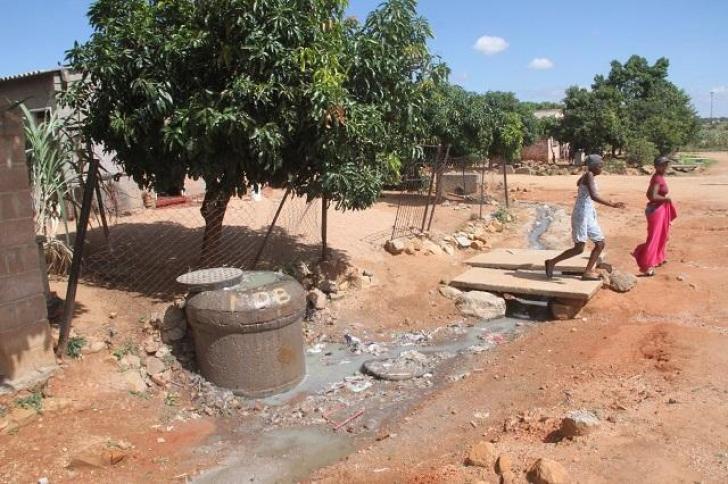News / National
Used pads cause major sewer blockages in Bulawayo
11 Oct 2024 at 14:53hrs |
0 Views

Bulawayo residents are frequently frustrated by burst sewer pipes, often blaming the local authority for failing to maintain infrastructure. However, a recent revelation from the city's environmental management and engineering services department has shed light on an unexpected cause of these frequent sewer blockages.
Officials disclosed that items such as plastics, sand, used sanitary products, diapers, and condoms are regularly being found clogging the city's sewer system, causing extensive blockages that are both costly and time-consuming to fix. These items have contributed significantly to the frequent bursts of pipes across the city, costing millions of dollars in repairs.
In response, the Bulawayo City Council (BCC) is urging residents to adopt the "bin it, not block it" mindset, encouraging proper disposal of waste to help prevent sewer blockages. According to city officials, by disposing of waste items responsibly, residents can contribute to reducing sewer overflows and the financial strain of repairing the system.
During a recent council meeting, Ward 2 Councillor Adrian Redani Moyo acknowledged the efforts of private contractors working in sewer hotspot areas. "A lot of improper materials causing sewer blockages had been removed by these private contractors. Some of the materials removed included sand and used sanitary wear," Moyo said, further stressing the importance of public education on proper waste disposal.
Moyo also criticized the local sewer teams for not thoroughly addressing reported sewer bursts and called for better supervision. "Council should effectively supervise its staff," he added. Other councillors echoed similar concerns. Ward 7 Councillor Thandiwe Moyo emphasized the need to engage residents on sewer challenges, particularly in areas like Sizinda and Tshabalala Extension.
Ward 16 Councillor Greater Gumede raised concerns about the situation near Mafakela Primary School in Luveve, where a sewer pipe frequently overflows next to a clean water supply line. "This could lead to contamination, resulting in a disease outbreak," she warned.
Meanwhile, Bulawayo City Council continues to point to its ageing water and sewage infrastructure as a significant factor behind the persistent bursts. Much of the city's reticulation system is over 40 years old and in desperate need of repair and replacement. Bulawayo Mayor Senator David Coltart recently acknowledged that financial constraints were hindering efforts to provide long-term solutions, citing the lack of funds needed to overhaul the system.
As the city grapples with the challenge of maintaining its ageing infrastructure, residents are being encouraged to play their part in mitigating sewer blockages through responsible waste disposal. However, without substantial investment in infrastructure renewal, Bulawayo's sewage system will remain vulnerable to continued bursts and overflows.
Officials disclosed that items such as plastics, sand, used sanitary products, diapers, and condoms are regularly being found clogging the city's sewer system, causing extensive blockages that are both costly and time-consuming to fix. These items have contributed significantly to the frequent bursts of pipes across the city, costing millions of dollars in repairs.
In response, the Bulawayo City Council (BCC) is urging residents to adopt the "bin it, not block it" mindset, encouraging proper disposal of waste to help prevent sewer blockages. According to city officials, by disposing of waste items responsibly, residents can contribute to reducing sewer overflows and the financial strain of repairing the system.
During a recent council meeting, Ward 2 Councillor Adrian Redani Moyo acknowledged the efforts of private contractors working in sewer hotspot areas. "A lot of improper materials causing sewer blockages had been removed by these private contractors. Some of the materials removed included sand and used sanitary wear," Moyo said, further stressing the importance of public education on proper waste disposal.
Ward 16 Councillor Greater Gumede raised concerns about the situation near Mafakela Primary School in Luveve, where a sewer pipe frequently overflows next to a clean water supply line. "This could lead to contamination, resulting in a disease outbreak," she warned.
Meanwhile, Bulawayo City Council continues to point to its ageing water and sewage infrastructure as a significant factor behind the persistent bursts. Much of the city's reticulation system is over 40 years old and in desperate need of repair and replacement. Bulawayo Mayor Senator David Coltart recently acknowledged that financial constraints were hindering efforts to provide long-term solutions, citing the lack of funds needed to overhaul the system.
As the city grapples with the challenge of maintaining its ageing infrastructure, residents are being encouraged to play their part in mitigating sewer blockages through responsible waste disposal. However, without substantial investment in infrastructure renewal, Bulawayo's sewage system will remain vulnerable to continued bursts and overflows.
Source - bmetro
Join the discussion
Loading comments…






















